Barbara Deans, 60, has never wanted to be anything but a farmer, and today runs a 4,800-hectare enterprise. In recent years she has focused some serious challenges.
I grew up on our family farm in Nevertire. My two sisters and I were always part of the farm and only went away to boarding school under protest. We were country girls and all became farmers.
I met my husband Geoff at a B&S [bachelor and spinster ball]. He was on a family farm, Kamira, east of Coonamble on the edge of the plains, in partnership with his parents John and June and his brother Mark. We married in 1988 and a couple of years later split the partnership. His parents retired and Mark still farms next door with his wife Kerry.
We were always lucky in being surrounded by other
progressive farmers. We got into share farming and then spraying and minimum till came in. We made money where, if we’d still farmed traditionally, we wouldn’t have got crops. It was pretty exciting and everyone wanted to share what was working, which I think some of the older generation found odd. They were into guarding their secrets.
 The Dean family have reverted back to farming sheep after they swapped to black cattle in the early 90s.
The Dean family have reverted back to farming sheep after they swapped to black cattle in the early 90s.
We started growing chickpeas and they did well, especially when a depot nearby started taking them and we swapped our sheep for black cattle, which ended up being flavour of the month. We also kept adding new blocks. It took a bit of organising with rotations and harvest trucks but we ended up with a lot of lovely neighbours – 26 in all!
Even when the kids came along, Tallah, Nathaniel and Linden, I was still hands-on. Linden remembers sleeping on the floor of my tractor, which was very unhealthy, all that dust around his little face. I always treated Tallah the same as the boys.
We never tried to talk any of them into farming but all Linden ever drew was tractors, and Tallah and Nathaniel loved animals and the outdoors, so it would’ve surprised me if they’d done anything different.
Cancer diagnosis altered the dynamics on family farm operations in Nevertire
In 2011, Geoff developed a tumour on his eye. He got treatment but at harvest he was making strange decisions and his arm and leg stopped working. He was diagnosed with five brain tumours. A brilliant surgeon removed the one affecting his side and he had chemo and radiation but the treatment affected his brain, so he was no longer able to farm.
When Geoff first got crook, the two boys were at school and Tallah was on a cattle station up north. Luckily we had a very good fellow working with us and our neighbours helped, pulling fencing out of the creek if a wash came through and putting the cows back if they got in the wrong place.
Luckily, Geoff and I had always worked on an annual budget so that ended up providing direction, and when it did get a bit dry and I had to return to the bank to ask for a bit more, I had that understanding.
I’d always liked using machinery and fixing it isn’t too scary – it’s only scary if you have to pay someone else to fix it – so I just stepped up.
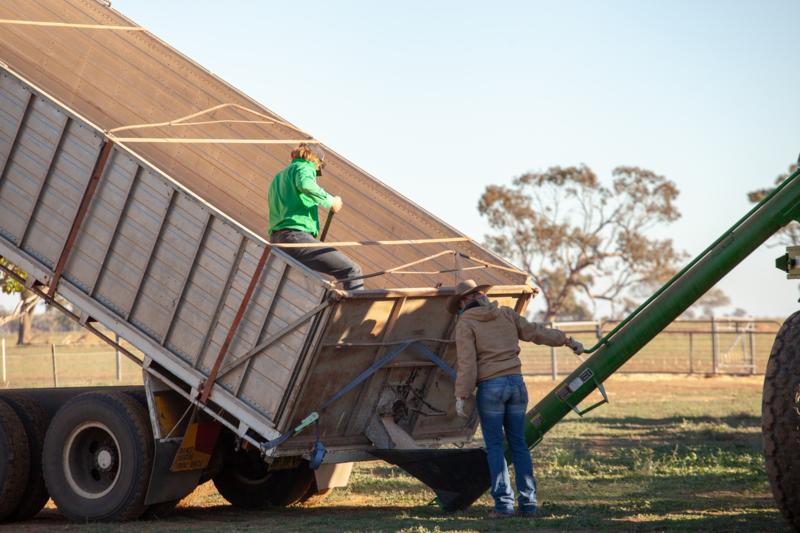 Linden and Tallah direct the seed tiller, one of the many machines in operation on Kamira.
Linden and Tallah direct the seed tiller, one of the many machines in operation on Kamira.
“I didn’t want to sell because I thought if I could just hang on a few more years, I could give the kids a choice to come back. It was pretty tiring but I’d done it all my life and that’s how it is.”
In 2013, Tallah, who was then 23, and her husband Ricky did come home. They had good ideas and were very hard workers so that was wonderful and made those couple of hard years worth it. It would’ve been terrible if I’d given up and they’d missed out.
Tallah liked the cattle – although she’s replaced them with sheep now – and she’s taken over managing us. Then Linden left school and loves cropping, so that got those two roles going. Linden is about to turn 24 and young to have so much responsibility.
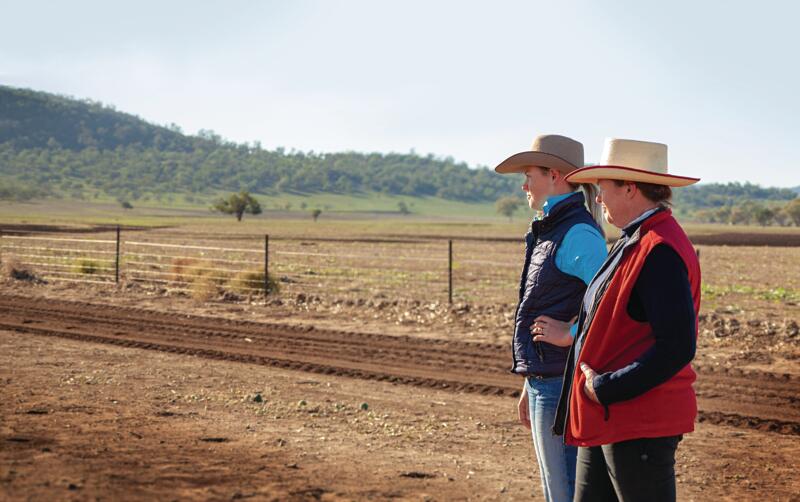 Tallah Looten and her mother Barbara Deans on their family farm Kamira, 60km south of Coonamble.
Tallah Looten and her mother Barbara Deans on their family farm Kamira, 60km south of Coonamble.
I can be a bit of a dinosaur but they say: “Mum that’s how it works now,” and I tell them: “Well it seems a bit experimental but you’ve done your research so let’s go with it.” I let them make the decisions but step in if I feel something won’t work. Because I’ve always looked after
the land, I’m also the one who warns: “Linden, you’re not pushing that tree out! That tree stays!”
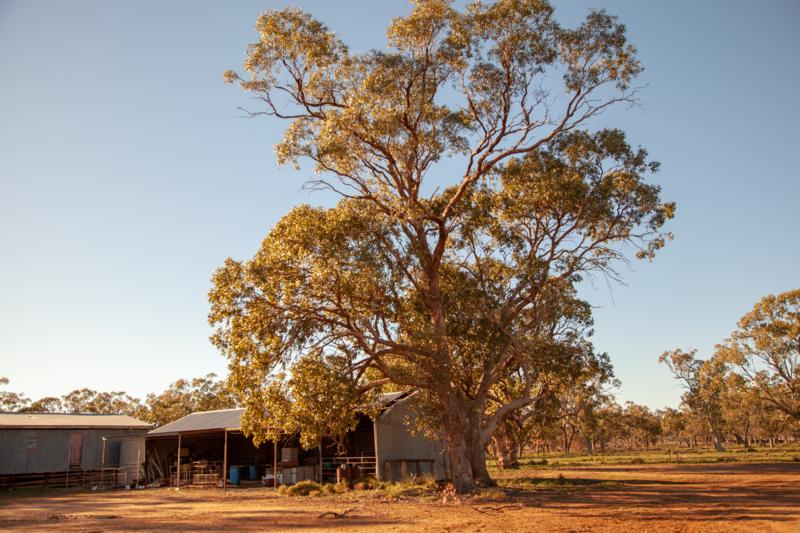 Barbara makes sure landcare is a priority in all decision making processes.
Barbara makes sure landcare is a priority in all decision making processes.
Nathaniel, 27, is studying veterinary science. We were drawing up a succession plan in 2015 when it was interrupted by the news that the
new Inland Rail line was going to come right through the middle of our home block, 500m from our house. Geoff and I have everything invested in this place. His father built it and I thought we would live out our days here.
RELATED ARTICLES:
We all want an inland rail network
Life of a young farmer
Inland rail remains a hot debate
Rail transport provides profit potential
The community rallies together to fight against proposed Inland Rail line
There’s a stream of arguments for and against simply using the existing [rail] line, but I decided that if I was so distraught, there would be a hell of a lot of other people who would be similarly upset at having their farms destroyed and their access taken away. So I
organised a meeting.
_preview.jpg) Tallah and Barbara with a historic photo of their station, next to a protest sign suggesting that the Inland Rail sticks to the existing corridors.
Tallah and Barbara with a historic photo of their station, next to a protest sign suggesting that the Inland Rail sticks to the existing corridors.
Seventy people came and NSW Farmers has been great in its support. As someone sensible observed: “Barb you have to fight because if you don’t, you’ll look back and wonder why.” It’s the same with drought. You have to have a bit of a fight to make it through to the end.
My kids are sick of hearing about it but they’re very good at covering for me. It’s using up a lot of time when I should be working, handling the drought and being part of their lives.
And fortunately, Geoff’s still happy. Although he’s failing, he’s not looking at being crook as we might, and that’s a good thing. If he can’t do anything about it, he might as well just watch the footy and think everything is fine.
RELATED ARTICLES:
Farmers meet with government
Inland Rail questions answered
Tallah Looten, 29, is the eldest of Barbara’s three children and the only girl. She’s shown she’s her mother’s daughter as she takes the reins of the farm.
My earliest memories are going out to check the sheep with my grandfather, a thermos and Golden Rough chocolate. I loved it but didn’t know if I’d return – I was adventurous and wanted to see what else was out there.
When I finished boarding school in 2007, I went up to the Gulf Country in Queensland and worked on cattle stations. I got to see country I never imagined I’d see and do lots of different jobs from handling cattle to fixing a bore. I met lots of like-minded people – including my husband Ricky.
Three days before my 21st birthday we discovered Dad had cancer. I travelled home while he had treatment but in 2013 it got worse. Mum told me: “It’s fine. I’ve got a handle on this.” But then one day she left me a message and was crying. That was a pinch point for me. I didn’t want to be in Queensland working for someone else. I wanted to be working for my family.
Mum and I bumbled around a bit for the first couple of months but we had a worker who stayed on to lend a hand. Our agronomist has always been very helpful and family, friends and neighbours were all open to a discussion. I didn’t hesitate to quiz a lot of people about a lot of things.
_preview.jpg) Barbara and Tallah were open to ideas and discussion with friends and family when the reins were passed to them about what the next steps were for Kamira.
Barbara and Tallah were open to ideas and discussion with friends and family when the reins were passed to them about what the next steps were for Kamira.
I’d done a few summers of harvest and sowing seasons so while I may not have known the finer details such as what bearing went in what machine, I knew how everything ran and I’d learned a lot of skills up north and had started an agricultural business course.
Mum has always been handy. She and her sisters are strong independent women but it was tough on her. Linden had been diagnosed with cancer when he was 12 so she’d already been through that back and forth to Sydney, looking after the family and keeping everyone sane. Now she had to do it again with Dad.
_preview.jpg) Co-cropping manager Linden ploughing a paddock.
Co-cropping manager Linden ploughing a paddock.
Although it was a bit rough, we got 2013 out of the way and then started talking about where everyone wanted to be and started work on our succession plan.
By now Linden had finished Year 12, so we offered him the same opportunities to travel as we’d had – but he wanted to join the farm. Nathaniel wanted to go to uni and as the drought got crunchy, Ricky got an off-farm job as a stock and station agent.
“Halfway through the succession process we heard the new Inland Rail line was going straight through our property. If it got the go-ahead it would affect everything from crossings to water flows so we had to put our plans on hold.”
We’re still not getting any answers, which seems shocking, especially with everyone doing it so tough in the drought.
RELATED: Eugowra family farm, hard work but rewarding
Focus has shifted on family farm Kamira, especially since the property was earmarked for the Inland Rail route.
The way we run things now, Mum is CEO and runs the bookwork, keeps tabs on orders and helps out on everything else. She’ll jump on the spray rig and loves to be on the header at harvest.
Linden is co-cropping manager with me and he’s in charge of machinery and spraying while I oversee everything and do the stock management. I’m also our planner.
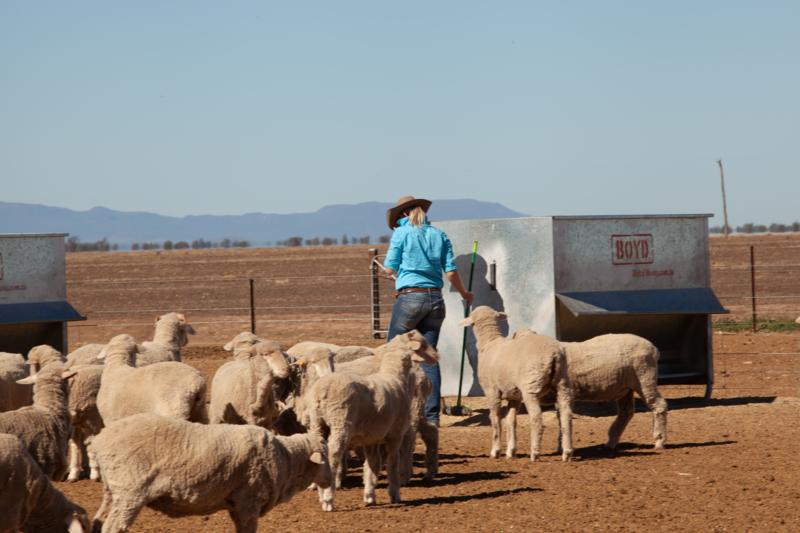
Sheep infrastructure from 1994 is back in operation as drought hits hard and Tallah decides the land is more suitable to sheep.
We did have Angus cattle when I got back but after two years of full feeding, I punched out the numbers and worked out what the land could do with sheep instead. We’d spent 20 to 30 years breeding the cattle and improving the genetics but there’s no money in skinny stock. I sent the girls off on a truck while they were still fat and worth something.
Although Dad had got rid of Pa’s [grandfather John’s] sheep in 1994, we still had the infrastructure so today we’re running about 900 ewes and 500 lambs. We also grow wheat, barley, canola, chickpeas, fava beans and mung beans and we’ve been doing a bit of contracting work outside the farm, spraying and planting, so we keep busy.
Even though the rail line means we can’t make major decisions at the moment, we’re running a profitable business. We just hope it rains. Linden and I have a joke that if we ever get an average season we won’t know what to do with ourselves because we’ve only ever had drought or floods.
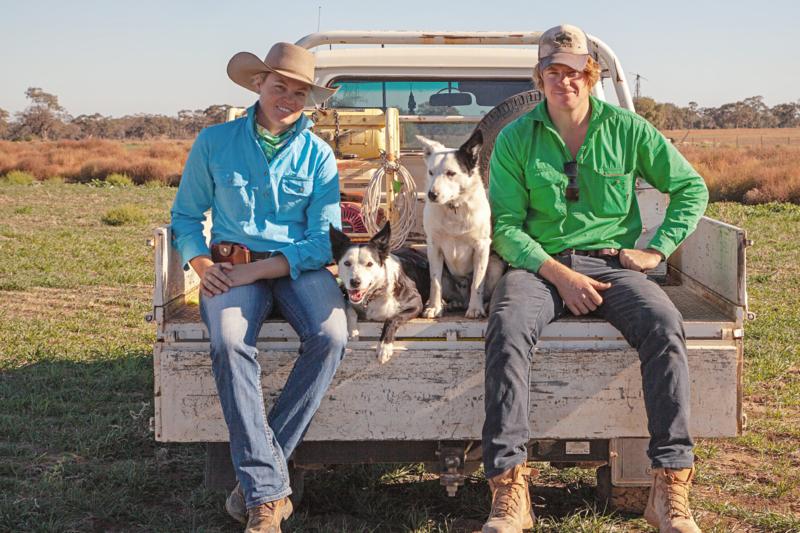
Tallah and Linden joke they won’t know what to do in an average season. They are either faced with drought or flooding rains.
Dad is now happy in himself as well. He doesn’t have a lot of memory and his mobility is depleted but he can still climb in a car with us and come out to check the ewes or machinery. He tells everyone he’s now fifth in line – we’re all the bosses and he’s just chilling at the back.
Committee leaders agree an inquiry into the proposed Inland Rail route is needed to get the best results for our agriculture communities.
Inland Rail Committee chair Adrian Lyons
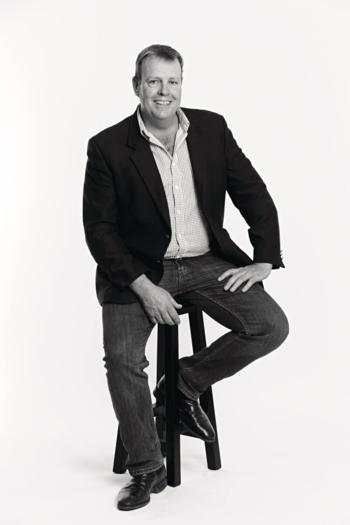
Inland Rail Committee chair Adrian Lyons says: “NSW Farmers will continue to fight for families like the Deans who are concerned about the route of the Inland Rail and the impact it will have on their farm businesses.
“We continue to pursue an inquiry into the route selection – until such time as an inquiry is conducted, we continue to advise members not to engage with the Australian Rail Track Corporation.
We support Inland Rail and we want to see it done right – it is important that an inquiry is conducted to give communities and impacted farming families confidence that the proposed preferred route is indeed the very best option.
"With three years until the next election, we encourage the re-elected Coalition government to reconsider its previous opposition to an inquiry, and support the country communities which have supported it for so long.”
Outgoing CWA state president Annette Turner

The Country Women’s Association (CWA) of NSW has added its voice to the call for an independent inquiry into aspects of the Inland Rail.
Outgoing CWA state president Annette Turner says the organisation recognises the value of the project to rural and regional areas, and to the national agricultural sector. However, she says: “Aspects of the planning are flawed and have caused an enormous amount of unnecessary stress to affected landholders
"Prime agricultural land has been earmarked for the greenfield sections of the project and we’re arguing there’s a better way in many instances,” she told the Narromine News. “Our members believe an inquiry into the project is the only way of resolving these issues and ultimately getting the best result for our communities, our farmers and the agriculture industry.”